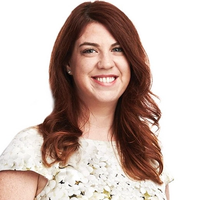
Rounding it up
Author and entrepreneur Shannon Lee Simmons knows how real the struggle is. That’s why she wants to share her own money stories.
Like what she did with her first paycheque—bought a suit and put the rest into paying off her student debt (AKA the responsible choice).
The best finance advice Shannon received? To invest in herself.
That might have propelled Shannon to found the New School of Finance, a financial planning firm geared towards millennials and entrepreneurs.
Shannon Lee Simmons knows how real the struggle can be. As the founder of the New School of Finance, a fee-only financial planning firm geared towards millennials and entrepreneurs, she's busy enough. She is also a regular columnist for CBC’s On The Money and Metro Morning and author of Worry-Free Money: The Guilt-Free Approach to Managing Your Money and Your Life. We caught up with Simmons to ask her five personal finance-related questions. Here's what she told us.
Tell us about your first real paycheque. What did you do with it?
This is so nerdy of me. I bought a suit, and then I put the rest on my student debt. I was working on Bay Street in Toronto, and so as a new grad I didn’t have any nice clothes to wear to work. I actually got two suits I think and I put the rest on my student line of credit. It was the first time I was able to make a payment on my own. It was nothing fancy but it was the first time I’d ever bought a suit so I felt like such a grown up.
Can you tell us about a time when you set a financial goal and you achieved it?
I had a wedding in 2014 and I wanted to pay for the whole thing without having any sort of financial hangover afterwards, so that was definitely a goal I had set that we were able to make. It was the first time that my partner and I had worked as a team towards a shared common goal besides you know, just like saving up for a vacation or something. We both wanted to have the big wedding and the big party, but we didn’t want it to be one of those things that we regretted financially. The wedding came and went and we didn’t have any debt afterwards which was really great. Our wedding costs were $20,000 and so that’s what we were trying to save up. We were trying to do that over an 18-month period and then we kind of fell a little bit short of that. We only managed to save up about $15,000, but we ended up getting some gifts and stuff at the wedding so that paid for the rest of it.
Who is your money mentor? What advice did they give you?
My ex-boss from Bay Street is my money mentor. She told me to invest in myself and that I think has been the best advice I’ve gotten because I can apply it in so many ways. It basically gave me the guts to go out and try to make it on my own, to put the money and time in to grow myself. She was my boss, but also in that way that she is a woman who is like a boss. She became my mentor because a) she is actually good with money: she’s phenomenal and financially responsible. But b) she also helped me navigate the financial industry. I was very young when I was starting out and she kind of showed me how to actually navigate the murky waters and that it’s possible to be successful and not lose yourself. She really motivated me and empowered me to get involved in the financial industry and made it less intimidating for me, being a young female who wanted to enter that world. I often joke that she’s my boss, turned mentor, turned friend, turned family.
"My ex-boss from Bay Street is my money mentor. She told me to invest in myself and that I think has been the best advice I’ve gotten because I can apply it in so many ways."
What’s the best investment that you’ve made to date?
I would say my brain, going to school and getting an education. I have no regrets about going to school even though I incurred debt with it. And I would also say my best investment has been my people at the New School of Finance, like the team. My employees that I hired have been my single best investment aside from my brain because they’re helping me grow the business in a way that I couldn’t do on my own. I mean it. They’re the best.
What would you do if $1,000 appeared in your wallet right now? What if this was $100,000?
I would probably put $500 into my RRSP and that would be my financial part or my responsible part, and then the other $500 I would probably put it in my vacation fund because I really, really, really want to go away soon. We’re not really sure where but we’re planning a vacation sometime in the fall and we’re thinking maybe Chicago or somewhere like New York. If I got $100,000 I would probably spend $5,000 on a trip, and probably use the rest towards a down payment to buy a house in Toronto.

About the author
Shannon Lee Simmons is a certified financial planner, chartered investment manager, life coach and speaker, and the founder of the award-winning New School of Finance.
Read more about this author